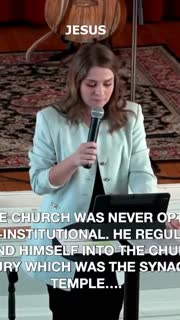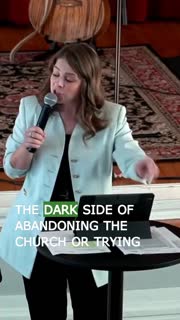Embracing Togetherness: The Church's Journey of Growth
Devotional
Sermon Summary
Bible Study Guide
Sermon Clips
1. "Let's face it. The church can be a super painful place. And it has been a particularly painful place for many in Kansas City over the last year. There has been no shortage of scandal, moral failure, and church closures. In our own backyard and in our own city. As theology professor Brad East puts it, Understandably, to many it may seem easier to just throw the baby out with the bathwater. To say, I can do this whole Jesus thing, but I'm just not so sure about the church anymore." [03:19] (43 seconds)
2. "I have had every excuse in the book to abandon the institution, to embrace a more private religion, to wage war against the religious machine, or to just... throw up my hands in defeat, discouragement, and resignation. However, despite all of this pain, all of his hurt, the legitimate dysfunction sometimes of the organized church, I still believe in it. I believe in the church because my heart still longs for this kind of community." [04:34] (33 seconds)
3. "Jesus was not anti-institutional. He regularly led the disciples and himself into the church of the first century, which was the synagogue and the temple. Jesus immersed himself in the relationships at the temple. He went to the temple for prayer, and he added his own voice to the teachings of that temple. This is not to say the temple or the synagogue, Jesus's day was perfect. In fact, far from it. Jesus and his disciples did not turn a blind eye to the corruption of the religious leaders or to the institution." [06:47] (40 seconds)
4. "The fruit of the Spirit, or our spiritual growth, is not grown abstractly, but it's rooted in a people and a place. We grow in love by being in proximity to our enemies, or people who are less than loving to us. We grow in patience by being around people for whom patience is required. We grow in self-control by taming the anger, annoyance, and frustration caused by the people around us. Maturity is born from difference, diversity, and dare I even say, church conflict." [12:09] (39 seconds)
5. "The dark side of abandoning the church or trying to do the Jesus stuff alone is this. When you have no one around you that is shaping you towards Christ, Christ ends up looking a whole lot like you. And you know and I know that that is not a Christ that anybody wants to follow. This is why Jesus, without the church, does not exist on the pages of scripture." [13:03] (27 seconds)
6. "But I still believe the church of Jesus Christ is worth fighting for. This thing that has been rooted in history, grounded in the saints, practiced for centuries, the place for miraculous healings, 180s, families being restored, forgiveness extended, communities being transformed, and love existing. I believe it's worth it. And so if you call this church your home, or if you would like to call this church your home, we want you to know what it means to reveal the kingdom of Jesus." [13:54] (39 seconds)
7. "You cannot be shaped by other people. You cannot grow in the fruits of the spirit in spiritual maturity by coming to church 12 to 20 times a year. You cannot become a concert pianist if you only practice 12 times a year. You cannot become a master rock climber if you only climb 12 times a year. You cannot be a good parent. If you rarely see your child. You cannot be a good boss if you only talk to your employees one to two times a month. You cannot experience transformation or be shaped by others if you rarely show up." [20:15] (32 seconds)
8. "I cannot promise that this community will be perfect. In fact, I can actually promise you the opposite. We will be messy. Alex and I will fail you. One of our leaders will fail you. You will experience conflict with others. You will not like everyone. And sometimes you just won't have the energy for it. But I can promise you that if you commit to revealing Jesus' kingdom, to belonging to a microchurch, to gathering on Sunday, serving one another, and the greater Kansas City community, and to generosity, we will shape one another more towards the person of Christ every day." [32:26] (44 seconds)
9. "I want a community that knows the contours of my life because they're close enough to observe it. I want a community that has known suffering and victory with me. I want friendships that feel more like family, that break into my refrigerator, sleep on my couch, and ask me to take them to the airport at 6am. I want a community that challenges me to follow Jesus more wholeheartedly, more sacrificially, and more faithfully than I ever have before. This is the type of community I want." [36:51] (39 seconds)
10. "This teaching is simply my effort at an invitation to examine your commitment to Jesus' church and this family and ask the question, Jesus, what step do I need to take as I reveal your kingdom with other people?" [37:22] (18 seconds)
Ask a question about this sermon
2. "I have had every excuse in the book to abandon the institution, to embrace a more private religion, to wage war against the religious machine, or to just... throw up my hands in defeat, discouragement, and resignation. However, despite all of this pain, all of his hurt, the legitimate dysfunction sometimes of the organized church, I still believe in it. I believe in the church because my heart still longs for this kind of community." [04:34] (33 seconds)
3. "Jesus was not anti-institutional. He regularly led the disciples and himself into the church of the first century, which was the synagogue and the temple. Jesus immersed himself in the relationships at the temple. He went to the temple for prayer, and he added his own voice to the teachings of that temple. This is not to say the temple or the synagogue, Jesus's day was perfect. In fact, far from it. Jesus and his disciples did not turn a blind eye to the corruption of the religious leaders or to the institution." [06:47] (40 seconds)
4. "The fruit of the Spirit, or our spiritual growth, is not grown abstractly, but it's rooted in a people and a place. We grow in love by being in proximity to our enemies, or people who are less than loving to us. We grow in patience by being around people for whom patience is required. We grow in self-control by taming the anger, annoyance, and frustration caused by the people around us. Maturity is born from difference, diversity, and dare I even say, church conflict." [12:09] (39 seconds)
5. "The dark side of abandoning the church or trying to do the Jesus stuff alone is this. When you have no one around you that is shaping you towards Christ, Christ ends up looking a whole lot like you. And you know and I know that that is not a Christ that anybody wants to follow. This is why Jesus, without the church, does not exist on the pages of scripture." [13:03] (27 seconds)
6. "But I still believe the church of Jesus Christ is worth fighting for. This thing that has been rooted in history, grounded in the saints, practiced for centuries, the place for miraculous healings, 180s, families being restored, forgiveness extended, communities being transformed, and love existing. I believe it's worth it. And so if you call this church your home, or if you would like to call this church your home, we want you to know what it means to reveal the kingdom of Jesus." [13:54] (39 seconds)
7. "You cannot be shaped by other people. You cannot grow in the fruits of the spirit in spiritual maturity by coming to church 12 to 20 times a year. You cannot become a concert pianist if you only practice 12 times a year. You cannot become a master rock climber if you only climb 12 times a year. You cannot be a good parent. If you rarely see your child. You cannot be a good boss if you only talk to your employees one to two times a month. You cannot experience transformation or be shaped by others if you rarely show up." [20:15] (32 seconds)
8. "I cannot promise that this community will be perfect. In fact, I can actually promise you the opposite. We will be messy. Alex and I will fail you. One of our leaders will fail you. You will experience conflict with others. You will not like everyone. And sometimes you just won't have the energy for it. But I can promise you that if you commit to revealing Jesus' kingdom, to belonging to a microchurch, to gathering on Sunday, serving one another, and the greater Kansas City community, and to generosity, we will shape one another more towards the person of Christ every day." [32:26] (44 seconds)
9. "I want a community that knows the contours of my life because they're close enough to observe it. I want a community that has known suffering and victory with me. I want friendships that feel more like family, that break into my refrigerator, sleep on my couch, and ask me to take them to the airport at 6am. I want a community that challenges me to follow Jesus more wholeheartedly, more sacrificially, and more faithfully than I ever have before. This is the type of community I want." [36:51] (39 seconds)
10. "This teaching is simply my effort at an invitation to examine your commitment to Jesus' church and this family and ask the question, Jesus, what step do I need to take as I reveal your kingdom with other people?" [37:22] (18 seconds)










